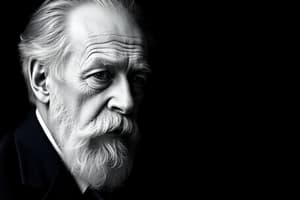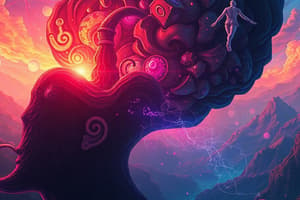Podcast
Questions and Answers
Despite some of his views being criticized and debunked, he is considered as a very well known psychologist because of his very interesting theory about the unconscious and also about sexual development.
Despite some of his views being criticized and debunked, he is considered as a very well known psychologist because of his very interesting theory about the unconscious and also about sexual development.
- Sigmund Freud (correct)
- Henry Cavill
- John Locke
- Erik Erikson
This is the part of us that we can reach if prompted, but is not in our active consciousness. It's right below the surface, but still “hidden” somewhat unless we searched for it. It is also called as our preconscious.
This is the part of us that we can reach if prompted, but is not in our active consciousness. It's right below the surface, but still “hidden” somewhat unless we searched for it. It is also called as our preconscious.
- Subconscious (correct)
- Conscious
- Preconscious
- Unconscious
The personality component that operates on the pleasure principle. This focuses on immediate gratification or satisfaction of its needs.
The personality component that operates on the pleasure principle. This focuses on immediate gratification or satisfaction of its needs.
- ego
- superego
- id (correct)
- none of the above
It’s during this stage that sexual urges remain repressed. The children’s focus is the acquisition of physical and academic skills. Boys usually relate more with boys and girls with girls during this stage (6 yrs old - puberty).
It’s during this stage that sexual urges remain repressed. The children’s focus is the acquisition of physical and academic skills. Boys usually relate more with boys and girls with girls during this stage (6 yrs old - puberty).
The child’s focus of pleasure in this stage is the anus. The child find satisfaction in eliminating and retaining feces. Through society’s expectations, particularly the parents, the child needs to work on toilet training (18 months - 3 yrs old)
The child’s focus of pleasure in this stage is the anus. The child find satisfaction in eliminating and retaining feces. Through society’s expectations, particularly the parents, the child needs to work on toilet training (18 months - 3 yrs old)
This embodies a person’s moral aspects. This develops from what the parent’s teachers, and other person who exert influence impart to good or moral. This is linked to conscience because it exerts influence on what one considers right and wrong.
This embodies a person’s moral aspects. This develops from what the parent’s teachers, and other person who exert influence impart to good or moral. This is linked to conscience because it exerts influence on what one considers right and wrong.
The fifth stage of psychosexual development begins at the start of puberty when sexual urges are once again awakened. In earlier stages, adolescents focus their sexual urges towards the opposite sex peers, with the pleasure centered on the genitals (puberty onwards).
The fifth stage of psychosexual development begins at the start of puberty when sexual urges are once again awakened. In earlier stages, adolescents focus their sexual urges towards the opposite sex peers, with the pleasure centered on the genitals (puberty onwards).
During the preschooler age, children become interested in what make boys and girls different. Preschoolers will sometimes be seen fondling their genitals (3 - 6 yrs old).
During the preschooler age, children become interested in what make boys and girls different. Preschoolers will sometimes be seen fondling their genitals (3 - 6 yrs old).
Anal _____ is an obsession with cleanliness, perfection and control while anal _____ is where the person may become messy and disorganized.
Anal _____ is an obsession with cleanliness, perfection and control while anal _____ is where the person may become messy and disorganized.
In the oral stage, the erogenous zone for newborns to 18 months is _____.
In the oral stage, the erogenous zone for newborns to 18 months is _____.
Flashcards
Subconscious
Subconscious
The part of the mind that is not in our active awareness, but can be retrieved with effort, also known as the preconscious.
Id
Id
The part of the personality that seeks immediate satisfaction of needs, operating on the pleasure principle.
Latency Stage
Latency Stage
Psychosexual development stage where sexual urges are repressed; focus shifts to skills and relationships with same sex; lasts from 6-puberty.
Anal Stage
Anal Stage
Signup and view all the flashcards
Superego
Superego
Signup and view all the flashcards
Genital Stage
Genital Stage
Signup and view all the flashcards
Phallic Stage
Phallic Stage
Signup and view all the flashcards
Psychosexual Development
Psychosexual Development
Signup and view all the flashcards



